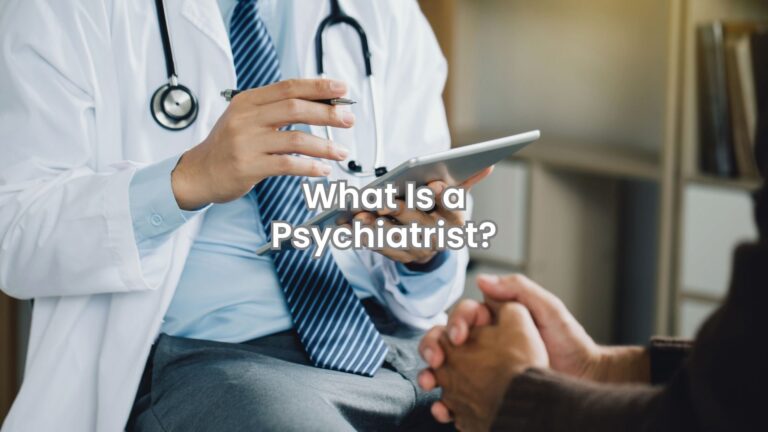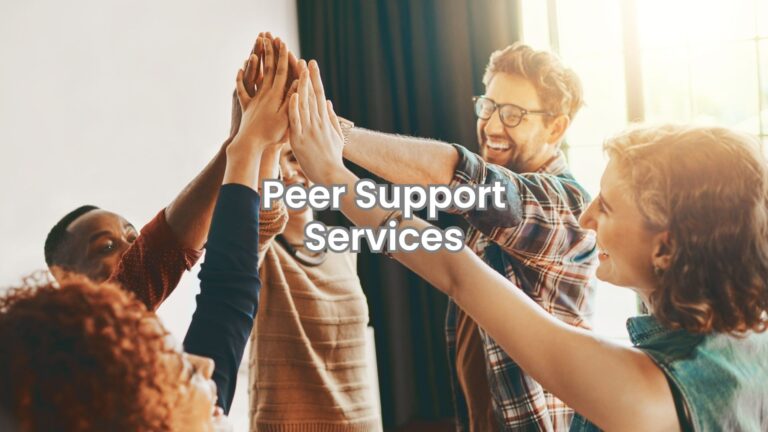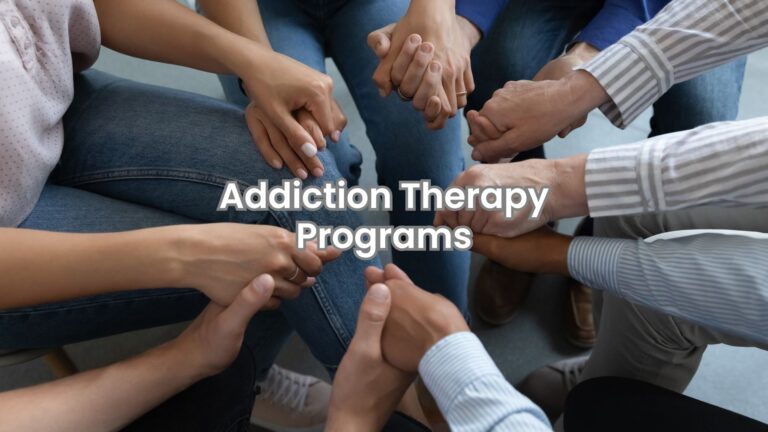Let’s be real: addiction isn’t just a habit you can drop tomorrow. It’s a beast that requires real, structured care to conquer for good. If you’re looking for Addiction Therapy Services that genuinely work, that’s what we’re here to break down.
Addiction therapy doesn’t need to be this complicated, intimidating thing.
You’re here because you’re done with quick fixes and want lasting results.
So, let’s talk about how Addiction Therapy Services right here in Ohio can be the difference between a revolving door of rehabs and genuinely kicking addiction.
What Makes Addiction Therapy Services So Important?
Look, everyone’s been there: the friends who try to give advice, the internet lists that promise quick wins, and maybe you’ve even tried quitting cold turkey on your own.
Here’s the reality: Addiction Therapy Services bring the structure, expertise, and support that’s practically impossible to get on your own.
When you’re in a professional setting, it’s not just you versus the problem—it’s you plus a dedicated team, resources, and programs designed specifically for recovery.
Why Choose Professional Addiction Therapy Services?
- Accountability and Structure
You’ve probably tried to quit on your own a hundred times.
But what happens when you’ve had a rough day, and willpower’s not enough?
Professional services add that layer of accountability—helping you stick to a recovery plan. - Therapeutic Approaches
Ever heard of Cognitive Behavioral Therapy (CBT), Group Therapy, or Adventure Therapy?
These aren’t just buzzwords.
They’re evidence-based methods used by addiction therapy services to rewire your responses and help you think differently about addiction triggers. - Medical Support and Safety
Withdrawal’s no joke.
For substances like alcohol or benzos, the withdrawal process can be dangerous without proper medical support.
Facilities with Vivitrol clinics near me offer supervised medication options that make detox safer and more comfortable. - Community
One of the biggest challenges with addiction recovery is isolation.
Through therapy programs, you’re part of a community where you’re never going through it alone.
Having people who get it? That’s the support many of us didn’t even know we needed.
Types of Addiction Therapy Services
Now that you know why addiction therapy is essential, let’s talk about the options.
Different approaches work for different people, so it’s worth exploring what each therapy type offers.
1. Inpatient Addiction Therapy Services
Inpatient services are for those who need a full reset—a break from daily life, habits, and triggers to start fresh.
If you’re thinking “That sounds intense,” it is. But it works.
How Inpatient Therapy Works:
You stay at a facility, usually 24/7, where everything is controlled for recovery.
There’s no access to substances, constant support, and a focused environment where you can fully commit to beating addiction.
Inpatient therapy typically includes:
- Intensive Daily Therapy
- Medical Detox
- 24/7 Supervision
- Structured Schedules and Activities
If you’ve tried the “weekend warrior” approach to recovery, maybe it’s time to commit fully.
Inpatient programs give you the immersive care that part-time programs can’t match.
2. Outpatient and Day Treatment Programs
For those who can’t take extended time off or prefer to stay connected to daily life, outpatient and day programs provide support without requiring a full-time stay.
You’ll attend therapy sessions, group counseling, and medical check-ups while still managing work or family responsibilities.
Outpatient programs are flexible, giving you:
- Customizable Schedules
- Therapy and Counseling
- Access to Medical Support for Withdrawal and Detox
- Access to a Community without isolation
If you’re looking for Addiction Therapy Services that allow you to balance life with recovery, this is often the best fit.
Digging Deeper: Therapy Methods Used in Addiction Therapy Services
Effective recovery isn’t just about saying “no” to substances.
It’s about rewiring how you think, react, and cope. Let’s look at the main therapy methods used in addiction recovery.
1. Cognitive Behavioral Therapy (CBT)
CBT is all about reframing negative thoughts and behaviors.
If you’re addicted, certain thought patterns drive that habit.
CBT breaks those down, challenging you to see things differently.
Here’s why CBT is effective:
- Identifies Triggers: You’ll work with therapists to understand what sparks cravings.
- Develops Coping Strategies: Learn healthier ways to deal with stress, anger, or sadness.
- Focuses on Positive Change: CBT is practical. It’s not about talking through problems without direction—it’s about building solutions.
2. Group Therapy
Addiction is isolating. Group therapy reconnects you with people who “get it.”
Group sessions are about:
- Shared Experiences: Realizing you’re not alone.
- Accountability: Knowing others are rooting for you and holding you accountable.
- Learning from Others: Hearing what worked (or didn’t) for others can provide new strategies.
3. Adventure Therapy
Sometimes recovery happens best outside a therapy room. Adventure Therapy uses physical activities, challenges, and nature to help break through mental barriers.
It’s a hands-on approach that gets you out of your head and into new, positive experiences.
Breaking the Myths Around Addiction Therapy Services
Let’s talk about the biggest misconceptions that keep people from getting help.
Maybe you’ve heard some of these, or maybe they’ve held you back. Let’s break them down.
Myth 1: “I Can Quit On My Own”
How many times have you said this? If willpower alone could solve addiction, there’d be no need for addiction therapy services.
The truth is, addiction is a complex issue that usually requires more than just “trying harder.”
That’s why professional help works. It provides the tools, structure, and accountability that self-discipline alone can’t match.
Myth 2: “Only Hardcore Addicts Need Therapy”
Addiction doesn’t have to look like the movies.
Maybe you’re a professional, a parent, or someone who has things mostly “under control”—until you don’t.
Addiction therapy is for anyone whose life is affected by substance use.
It’s not about how “bad” your problem is; it’s about getting real about what’s impacting your life.
Myth 3: “Therapy Will Fix Me Right Away”
Therapy isn’t a quick fix. It’s a process.
If you’re looking for Addiction Therapy Services that work, expect to put in time and effort. But the results? Long-lasting change that’s actually sustainable.

Choosing the Right Addiction Therapy Services for You
So you’re ready to take the next step. How do you pick a service that’s actually going to work?
Not all addiction therapy is the same, so it’s essential to choose a program that fits your needs.
What to Look For in a Program
- Qualified Staff
The best programs have licensed therapists, medical staff, and experienced counselors who specialize in addiction. - Evidence-Based Methods
Look for programs that use proven techniques like CBT, DBT, and medical support when needed. - Comprehensive Care Options
You’ll want options, from outpatient services to inpatient care and ongoing support. Flexibility is key. - Community and Support
Recovery doesn’t end after treatment.
Programs that offer alumni groups, check-ins, or community events keep you connected to support.
Why Ridgeline Recovery LLC Is a Top Choice
Located in Columbus, Ohio, Ridgeline Recovery LLC provides specialized addiction therapy services that combine traditional therapy, medical support, and community.
We understand that every person’s journey is unique, and we’re here to provide the personalized care you need.
Here’s what sets Ridgeline apart:
- Range of Services: From inpatient programs to day treatment, we offer a solution for every level of need.
- Experienced Staff: Our therapists, counselors, and medical team are experienced in addiction treatment, providing both compassionate care and expert advice.
- Comprehensive Care: We don’t just treat addiction; we treat the whole person—mind, body, and soul.
The Foundation of Effective Addiction Therapy Services
When it comes to truly effective Addiction Therapy Services, the difference between short-term and long-term recovery lies in the layers of care you receive. A “one-size-fits-all” approach? Doesn’t cut it. Quality addiction therapy is multifaceted, targeted, and crafted around you—because addiction itself is complex, impacting both the body and mind in profound ways.
So, let’s unpack the core elements of successful Addiction Therapy Services and why each component plays a pivotal role.
1. Personalized Assessment and Treatment Planning
What It Is: Customized Plans Based on YOU
Think of this as the blueprint stage of recovery. Addiction Therapy Services that actually work begin with an in-depth evaluation. This isn’t just filling out a form; it’s an entire process where experts assess everything from mental health, substance history, to physical well-being and personal goals.
Why This Matters
Every addiction journey is unique. A good assessment doesn’t just look at substance use. It examines underlying issues, like mental health challenges, relationship dynamics, and even genetic predispositions. This is critical in choosing the right approach, whether that’s outpatient care, inpatient programs, or specialized therapies like adventure therapy for treatment of substance use disorder.
Key Components in the Assessment Process:
- Substance Use History: An honest look at patterns, frequency, and history of use.
- Mental Health Evaluation: Identifying co-occurring disorders like anxiety, depression, or trauma.
- Physical Health Assessment: Addiction often wreaks havoc on the body, so physical health matters.
- Social and Family Dynamics: Family involvement and social circles can greatly impact recovery.
Each of these elements shapes a treatment plan that’s realistic and targeted, often making the difference between a relapse-prone journey and one that builds resilience.
2. Medical Detox and Withdrawal Management
The Physical Side of Recovery
Detox isn’t glamorous. But for certain substances, it’s a critical starting point that helps your body clear itself before you dive deeper into therapy. If you’re dealing with alcohol, benzodiazepines, or opioids, detox can be intense. Trying to quit drinking cold turkey? Or considering stopping opioids alone? That’s risky.
Here’s where Addiction Therapy Services with a solid medical detox program stand out. Facilities with Vivitrol clinic near me options, for example, offer treatments that reduce cravings and help stabilize withdrawal symptoms, making the early days of recovery safer and more manageable.
Why a Medically Supervised Detox Matters
- Safety: Withdrawal from substances like alcohol and benzos can be life-threatening without medical supervision.
- Comfort: Medical staff can prescribe medications to ease withdrawal symptoms, helping prevent an early relapse.
- Stabilization: Detox is like hitting the reset button on your physical health. It prepares you to enter therapy in a stable state.
If detox isn’t handled properly, those withdrawal symptoms, whether physical or psychological, can overwhelm you. That’s why detox centers are essential in any reputable addiction therapy program.
3. Addressing Dual Diagnosis in Addiction Therapy Services
Addiction rarely shows up alone. For many, it’s a coping mechanism for unresolved mental health issues. Depression, anxiety, PTSD, and other disorders frequently coexist with addiction. When this happens, it’s called a dual diagnosis—and it requires specialized care.
The Role of Mental Health Services
Effective Addiction Therapy Services address both sides of the issue: the addiction itself and the underlying mental health concerns. Treating one without the other? That’s setting up for failure. Facilities with mental health services near me offer integrated care where therapists and addiction specialists work together, providing comprehensive support that addresses both mind and body.
Dual Diagnosis Therapy Components:
- Psychiatric Evaluation: To diagnose and understand the mental health component.
- Medication Management: For those who need it, psychiatric medications can stabilize mood and anxiety.
- Specialized Therapy: Dialectical Behavioral Therapy (DBT) or Eye Movement Desensitization and Reprocessing (EMDR) may be used for trauma-related disorders.
If you’re looking for Addiction Therapy Services that actually work, finding a program equipped for dual diagnosis care is crucial. You’re not just breaking free from a substance—you’re rebuilding your entire mental and emotional resilience.
4. Group and Individual Therapy in Addiction Recovery
The Core of Therapy: Connection and Reflection
Group and individual therapy form the backbone of most Addiction Therapy Services. Both settings offer unique benefits. Individual therapy is where you get one-on-one time with a therapist who helps you dig deep, identify triggers, and build a strategy for a life free of addiction. Group therapy, on the other hand, provides community and accountability.
How Both Therapy Types Contribute to Recovery
- Individual Therapy:
This is where you can be vulnerable and honest about your struggles without judgment. Your therapist helps you process past traumas, understand triggers, and replace harmful coping mechanisms with healthy ones. - Group Therapy:
Addiction isolates people. Group therapy reconnects you with a community that “gets it.” You share experiences, support each other, and find strength in knowing you’re not alone. The power of shared experience can’t be underestimated.
In group settings, you may encounter approaches like CBT for addiction or DBT for impulse control, equipping you with practical tools for managing cravings and negative thoughts.
5. Family Therapy: Healing Beyond the Individual
Addiction doesn’t just affect the person; it impacts families, too.
Addiction Therapy Services that include family therapy acknowledge the ripple effects of addiction, working to repair and rebuild trust within relationships.
Why Family Therapy Matters:
- Rebuilds Trust: Addiction often leads to broken promises and damaged trust. Family therapy gives everyone a space to rebuild.
- Educates Family Members: Families learn what addiction is, what it isn’t, and how they can support (without enabling) their loved one.
- Establishes Healthy Boundaries: Therapists help families set boundaries, supporting recovery without compromising their own mental health.
For families in Ohio, finding addiction recovery Columbus Ohio programs with family therapy options can be a game-changer in achieving lasting recovery and unity.
6. Specialty Programs and Holistic Treatments
Sometimes, traditional therapy isn’t enough. Holistic and specialty programs bring additional dimensions to recovery, addressing physical, emotional, and social health in creative, integrative ways. These programs can include anything from adventure therapy for treatment of substance use disorder to sober houses that offer a safe, supportive environment for rebuilding.
Examples of Specialty Programs in Addiction Therapy Services
- Adventure Therapy: Combines outdoor activities with therapy to build self-esteem and resilience.
- Sober Living: Offers a structured, substance-free living environment post-treatment.
- Art and Music Therapy: Channels creativity into healing, providing new outlets for self-expression and stress relief.
Holistic approaches can sometimes be the missing piece in recovery, giving individuals the tools to handle life’s challenges in a balanced, healthy way.
7. Aftercare and Relapse Prevention Planning
Relapse is part of the journey for many, but with strong aftercare, it doesn’t have to mean failure. Aftercare and relapse prevention are where Addiction Therapy Services really prove their worth.
How Aftercare Works
After you’ve completed the core phases of treatment, aftercare keeps you connected to a support network, which can include:
- Regular Check-ins with a Therapist: A chance to discuss challenges and wins, keeping you accountable.
- Alumni Groups or Support Groups: Staying connected with people who understand your journey.
- Relapse Prevention Training: Learning strategies for handling high-risk situations without turning back to substances.
Effective aftercare means you’re not left hanging when treatment ends. You’ve got a safety net that keeps you on track and prepared for whatever comes next.
Choosing the Right Addiction Therapy Services in Ohio
If you’re looking for addiction therapy near me in Ohio, the range of options can feel overwhelming. Start with programs like Ridgeline Recovery LLC, which combines evidence-based practices with compassionate care, offering options that cater to individual needs and goals.
Top Considerations When Selecting a Program
- Accreditation and Licensing: The facility should have qualified staff, licensed therapists, and accreditation that ensures quality care.
- Treatment Options: Look for programs that offer both inpatient and outpatient options, detox services, and specialty treatments.
- Family Involvement: If family support is crucial to your recovery, opt for programs that incorporate family therapy.
- Aftercare Planning: Ensure the program provides ongoing support and relapse prevention resources.
Choosing the right therapy isn’t just about checking boxes; it’s about finding a program that feels right for you and offers the tools and support you need to succeed long-term.
Maximizing Recovery with Specialized Addiction Therapy Services
Every journey to sobriety is unique, but the best Addiction Therapy Services have one thing in common: they offer tailored, specialized care to meet individuals where they are. Whether you’re facing addiction for the first time or seeking recovery support after previous relapses, specialized therapy helps address specific triggers and the underlying causes of addiction in ways that generic programs can’t.
The Role of Evidence-Based Practices in Addiction Therapy Services
Evidence-based practices (EBPs) are the gold standard in Addiction Therapy Services. These methods are backed by research and proven outcomes, meaning they’ve shown effectiveness in diverse settings with different types of addiction. When you’re comparing programs in Ohio, look for those with a strong foundation in EBPs, as these therapies can maximize your chances of successful recovery.
Key Evidence-Based Practices
- Cognitive Behavioral Therapy (CBT): Helps clients identify and change harmful thought patterns, equipping them to handle triggers and stressors without substance use.
- Motivational Interviewing (MI): Designed to increase motivation for change, MI is often used for people who may feel ambivalent about recovery. Therapists help patients set goals and build motivation through constructive conversation.
- Contingency Management (CM): This approach provides rewards for positive behaviors, like passing a drug test or attending a session. CM reinforces positive actions and helps replace unhealthy habits.
- Medication-Assisted Treatment (MAT): MAT is particularly effective for opioid and alcohol addiction. Clinics, including Vivitrol clinic near me options, offer medications that reduce cravings, supporting sustained recovery.
The power of EBPs lies in their adaptability; they’re evidence-based, but they can be tailored to fit individual needs, whether for inpatient, outpatient, or other specialized programs. As a foundation of quality Addiction Therapy Services, EBPs give clients the psychological tools they need to change behaviors and thought patterns for long-term success.
The Benefits of Inpatient vs. Outpatient Addiction Therapy Services
Both inpatient and outpatient settings have their pros and cons, and choosing the right one is critical. Your decision depends on the severity of your addiction, personal circumstances, and what fits best for your lifestyle.
Inpatient Addiction Therapy Services
Inpatient programs are immersive and intense. They’re structured environments where clients stay on-site, offering a focused, distraction-free space for healing. This is especially valuable for people who struggle with high-risk situations in their daily lives, like environments where substances are readily available.
Advantages of Inpatient Care:
- 24/7 Support: Around-the-clock access to medical and therapeutic support.
- Distraction-Free Environment: Separation from daily triggers and stressful situations.
- Intensive Therapy Options: Access to a range of therapies, including individual, group, and family sessions, with a packed schedule to maintain focus.
Outpatient Addiction Therapy Services
Outpatient therapy is typically a step down from inpatient care but still provides structured support. With outpatient programs, individuals live at home, often maintaining their job or studies, while attending scheduled therapy sessions multiple times a week.
Advantages of Outpatient Care:
- Flexibility: Ideal for individuals who need to balance recovery with other life responsibilities.
- Lower Cost: Generally more affordable than inpatient programs.
- Real-World Application: Clients can immediately practice new skills and coping mechanisms in real-life situations.
Both inpatient and outpatient programs are foundational to many Addiction Therapy Services in Ohio. The best option for you depends on your personal situation, including the severity of addiction and availability of local support systems.
Why Holistic Addiction Therapy Services Are Gaining Popularity
Holistic therapies go beyond traditional approaches, addressing every aspect of a person’s well-being, including physical, emotional, and social health. These therapies can be especially useful for those who haven’t found success with conventional methods or who want a more integrative approach to recovery.
Key Holistic Treatments in Addiction Therapy Services
- Mindfulness and Meditation: Helps individuals develop self-awareness and stay present, reducing impulsive actions that can lead to relapse.
- Yoga and Physical Exercise: Physical activity is beneficial for both mental and physical health, releasing endorphins that can improve mood and reduce stress.
- Nutritional Therapy: Diet plays a crucial role in healing the body and mind after addiction. Nutritional support can speed up physical recovery and improve overall well-being.
- Art and Music Therapy: Creative outlets allow individuals to express emotions and process experiences in non-verbal ways.
These therapies aren’t just add-ons; they play a vital role in enhancing overall well-being, a key factor in long-term sobriety. By treating the whole person, Addiction Therapy Services with holistic options can build resilience and emotional strength, offering tools that support recovery long after therapy ends.

Understanding Medication-Assisted Treatment (MAT)
MAT has transformed addiction therapy, especially for those dealing with opioid or alcohol dependence. It involves the use of FDA-approved medications, such as Vivitrol, to reduce cravings and block the euphoric effects of substances.
Key MAT Components:
- Vivitrol Clinics Near Me: Often part of a robust addiction therapy program, Vivitrol can help prevent relapse by blocking the effects of alcohol and opioids.
- Supportive Counseling: MAT isn’t just about medication; it’s combined with counseling to address behavioral and emotional aspects.
- Relapse Prevention: MAT provides a “buffer” against high-risk situations, helping individuals maintain sobriety when exposed to triggers.
Specialized Programs within Addiction Therapy Services
Different substances have different impacts on the brain and body, so it’s essential that treatment programs address these differences. Specialized programs often provide more targeted support, focusing on specific needs, whether they’re tied to the type of addiction or related mental health challenges.
Alcohol Addiction Therapy Services
For alcohol addiction, detox can be particularly challenging due to the potential for delirium tremens, a severe form of withdrawal. Facilities offering delirium tremens treatment or etoh rehab understand the specific risks associated with alcohol withdrawal and can provide safer, more effective care.
Polysubstance Addiction Therapy
Polysubstance addiction, where multiple substances are involved, adds complexity to recovery. This type of addiction requires tailored therapies that address the unique interactions of different drugs, and it’s common in cases involving combinations like alcohol and Xanax, or opioids and stimulants, sometimes referred to as speedballing.
Adventure and Outdoor Therapy
For those seeking alternative approaches, adventure therapy for treatment of substance use disorder introduces outdoor activities that challenge the body and mind. These experiences help clients build resilience and learn healthy risk-taking, creating a foundation for sober living.
Aftercare: The Foundation of Long-Term Success in Addiction Therapy Services
Completing a program is just the beginning. Quality Addiction Therapy Services offer comprehensive aftercare plans to keep clients connected and supported during the vulnerable transition back to everyday life.
Components of Effective Aftercare:
- Ongoing Therapy: Regular sessions with a counselor to stay accountable and address any new challenges.
- Support Groups and Alumni Programs: Staying connected with peers and mentors can reinforce commitment and provide emotional support.
- Sober Living Options: For individuals needing a gradual transition, sober houses provide a structured environment to practice sober living in a community setting.
Effective aftercare isn’t just a “nice-to-have”—it’s essential for relapse prevention and long-term success.
Addressing Relapse with Compassionate Care
Relapse doesn’t mean failure, and many successful recovery stories include moments of setback. In fact, relapse can offer insights that make the next attempt at sobriety stronger and more informed. Quality Addiction Therapy Services prepare individuals for the possibility of relapse with coping strategies, contingency plans, and a network of support to get back on track quickly.
How to Handle Relapse Effectively:
- Reflect on the Experience: Understanding what triggered the relapse can help in developing stronger strategies for the future.
- Return to Therapy: Re-engaging with a therapist can provide immediate support, helping to process the emotions surrounding the setback.
- Reconnect with Support Groups: Being around people who understand the ups and downs of addiction recovery can help rebuild motivation.
- Revise the Recovery Plan: Sometimes, the initial plan needs tweaks. Adding new coping mechanisms or additional therapy types can strengthen resilience.
Programs that approach relapse with compassion rather than judgment create a safer environment for clients to be honest about their struggles, enabling deeper, more authentic healing.
FAQs About Addiction Therapy Services
Q: What can I expect from addiction therapy services?
Expect a combination of individual therapy, group support, medical detox (if needed), and ongoing support.
Q: Are there therapy options for those with family or work obligations?
Absolutely. Outpatient services offer flexibility, allowing you to get the help you need while still managing other responsibilities.
Q: How long does therapy take?
Therapy duration varies. Some stay in treatment for weeks, others for months.
Q: Can I receive addiction therapy services if I have mental health issues?
Absolutely. Many facilities offer dual diagnosis treatment that addresses both addiction and mental health concerns, providing a comprehensive approach to recovery.
Q: How long do addiction therapy programs last?
The length varies based on individual needs, but programs can range from 30-day intensives to year-long outpatient programs.
Choosing Addiction Therapy Services in Ohio: What to Look For
In Ohio, there’s no shortage of Addiction Therapy Services options, but the best facilities offer comprehensive care tailored to individual needs. Whether you’re in Columbus, Cleveland, or Cincinnati, finding the right service can make all the difference.
Key Factors to Consider:
- Treatment Flexibility: Look for programs that offer both inpatient and outpatient options.
- Evidence-Based Practices: Programs that integrate EBPs such as CBT, DBT, and MAT are more likely to offer effective, research-backed support.
- Dual Diagnosis Support: If mental health issues are involved, dual diagnosis treatment is essential for a sustainable recovery.
- Aftercare Services: Long-term success relies on a solid aftercare plan; choose programs that offer ongoing support.
Call Us Now!
If you or a loved one is struggling with heroin or alcohol dependency, reach out to Ridgeline Recovery Center in Columbus, Ohio, today. At Ridgeline Recovery, we offer a path to hope and healing. Our comprehensive Addiction Recovery services include Addiction Therapy, Addiction Treatment, Vivitrol Clinic and specialized Mental Health Services designed to support your journey to recovery.
We provide Aftercare Programs and Peer Support to ensure you have ongoing assistance after treatment. Our dedicated team offers Case Management and Child Services for those needing extra support. For individuals who prefer a faith-based approach, we offer Faith-Based Recovery options.
Our programs feature Group and Individual Counseling, along with Medication-Assisted Treatment (MAT) to address your unique needs. We also have an Intensive Outpatient Program (IOP) and a Partial Hospitalization Program (PHP) for more structured care.
Our team includes Registered Nurse Services, Psychiatric Services, and Therapeutic Behavioral Services (TBS) to provide comprehensive support throughout your recovery process. We work with various Insurance Coverage plans to help you access the care you need.
Don’t wait—contact us now to start your journey toward a brighter future with Ridgeline Recovery.
For more stories and information Contact Us, visit our Blog page and Stories & Highlights.






